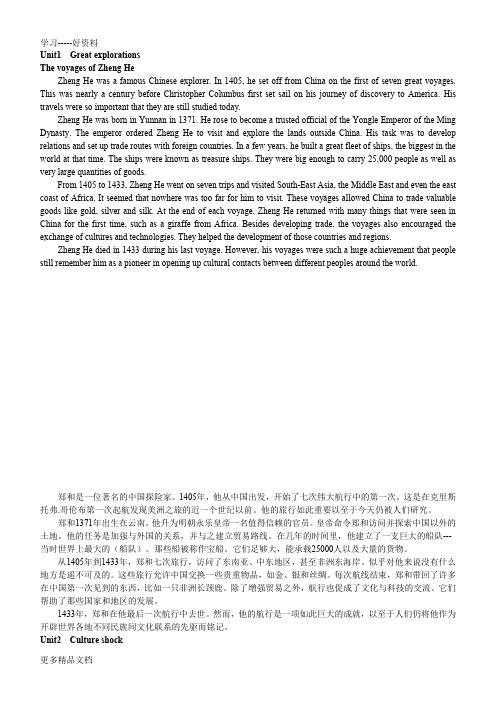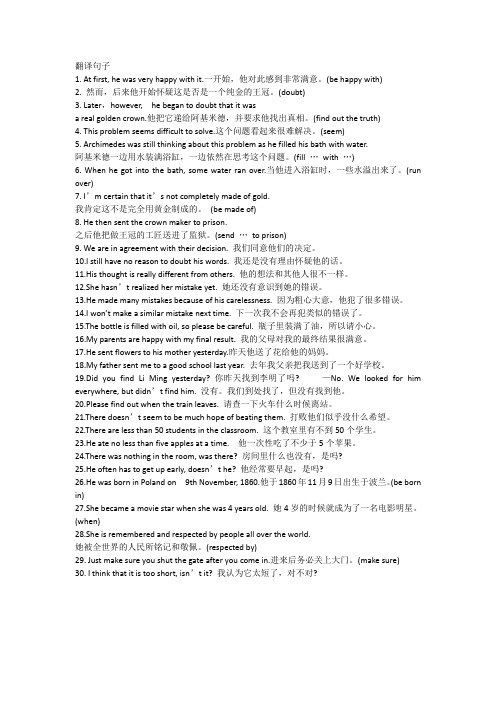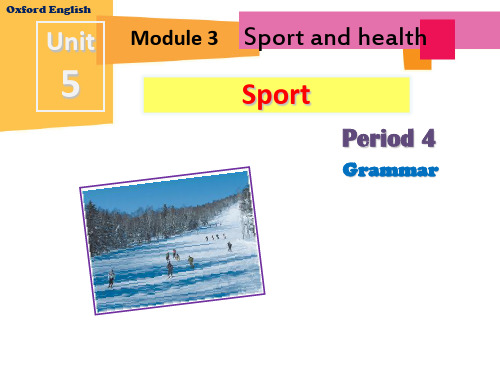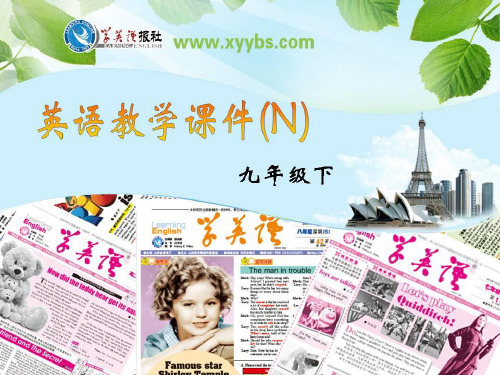深圳牛津版最新九年级(下)课文(带翻译)
最新沪教牛津版九年级下册课文与翻译汇编

Unit1 Great explorationsThe voyages of Zheng HeZheng He was a famous Chinese explorer. In 1405, he set off from China on the first of seven great voyages. This was nearly a century before Christopher Columbus first set sail on his journey of discovery to America. His travels were so important that they are still studied today.Zheng He was born in Yunnan in 1371. He rose to become a trusted official of the Yongle Emperor of the Ming Dynasty. The emperor ordered Zheng He to visit and explore the lands outside China. His task was to develop relations and set up trade routes with foreign countries. In a few years, he built a great fleet of ships, the biggest in the world at that time. The ships were known as treasure ships. They were big enough to carry 25,000 people as well as very large quantities of goods.From 1405 to 1433, Zheng He went on seven trips and visited South-East Asia, the Middle East and even the east coast of Africa. It seemed that nowhere was too far for him to visit. These voyages allowed China to trade valuable goods like gold, silver and silk. At the end of each voyage, Zheng He returned with many things that were seen in China for the first time, such as a giraffe from Africa. Besides developing trade, the voyages also encouraged the exchange of cultures and technologies. They helped the development of those countries and regions.Zheng He died in 1433 during his last voyage. However, his voyages were such a huge achievement that people still remember him as a pioneer in opening up cultural contacts between different peoples around the world.郑和是一位著名的中国探险家。
牛津深圳版九年级下册中英翻译资料

翻译句子1. At first, he was very happy with it.一开始,他对此感到非常满意。
(be happy with)2. 然而,后来他开始怀疑这是否是一个纯金的王冠。
(doubt)3. Later,however, he began to doubt that it wasa real golden crown.他把它递给阿基米德,并要求他找出真相。
(find out the truth)4. This problem seems difficult to solve.这个问题看起来很难解决。
(seem)5. Archimedes was still thinking about this problem as he filled his bath with water.阿基米德一边用水装满浴缸,一边依然在思考这个问题。
(fill …with …)6. When he got into the bath, some water ran over.当他进入浴缸时,一些水溢出来了。
(run over)7. I’m certain that it’s not completely made of gold.我肯定这不是完全用黄金制成的。
(be made of)8. He then sent the crown maker to prison.之后他把做王冠的工匠送进了监狱。
(send …to prison)9. We are in agreement with their decision. 我们同意他们的决定。
10.I still have no reason to doubt his words. 我还是没有理由怀疑他的话。
11.His thought is really different from others. 他的想法和其他人很不一样。
12.She hasn’t realized her mistake yet. 她还没有意识到她的错误。
牛津深圳版英语初中九年级下册(九下)课件:Unit 5 Period 4

Grammar B Review of the passive voice
Read and review.
Change the sentences below into the passive voice.
• We can finish the work in two days. • They produce silk in Suzhou. • The children will sing an English song. • He made me do that for him. • Did they build the bridge here one year ago? • We must water the flowers every day.
Ben: James:
Hi, James. What (1) ______ you________ (do)?
I (2) ______________ (prepare) for my trip. Oh, yes. The trip to Manchester. What (3)______ you ______(write)?
moment, these days
yesterday, at that
time
Complete the conversation below using the correct forms of the verbs in brackets.
Ben: James: Ben: James: Ben: James:
1 In 1879, Thomas Edison invented the first practical light bulb. S1: Who invented the first practical light bulb? S2: It was invented by Thomas Edison. S1: When was it invented? S2: It was invented in 1879.
【最新】牛津深圳版九年级英语下册Unit 2 Period 2精品课件.ppt

Playing in the snow in winter, playing baseball, going to a party dressed as Harry Potter at Halloween, and having a big dinner with a huge turkey at Thanksgiving.
Read the third and fourth paragraphs and complete the diagram.
Read the first two paragraphs and complete the following diagram.
Main idea Brad experienced __c_u_lt_u_r_e_s_h_o_c_k_ _in__t_h_e_U__S__ last year.
SupportingiBiblioteka one’s spare time
However, to a certain degree, life in the US was hard to get used to. My main problem was with the language. I failed to understand much in the first few weeks because everyone spoke so fast. Though I soon managed to get used to it, I still had problems because they used a lot of idioms. For example, they often say they are “under the weather” when they are ill. Their everyday English is very different from what we learn in China.
牛津深圳版九年级下册unit4naturaldisasters教学课件words.ppt

pass
通过
stare
盯着看;凝视
notice
注意意识到
awake-awoke-awoken 醒来
adv. badly immediately
严重地;厉害地 立即;马上
Page 29
adj.
alive
活着;在世
dead
不运行不转动的
deaf
聋的
missing
失踪的
expressions
那只可爱的小猫失踪了。
That lovely kitty is missing.
9. fellow adj. 同类的;同伴的
fellow workers/ students同事;同学
Page 23
10. stick with 持续;坚持
让我们持续我们的计划。
Let’s stick with our plan.
Page 26
11. 3)surprising adj. 令人吃惊的;
令人吃惊的新闻
surprising news
It’s surprising that 令人惊讶的是 令人惊讶的是他完成了那项困难的任
务。
It’s surprising that he managed to finish the hard job.
ears
盯着看;凝视
stare at
惊讶地
in surprise 暂时
for now
救生包(装有食物、
survival kit 医疗用具和工具)
Page 31
C1
1. dead= no longer working 2. stick with= continue with 3. deaf= not able to hear 4. notice= realize 5. awoke= stopped sleeping
牛津版九下 unit3 Robots U3P2 Reading

Ready?
Useful expressions Talking about the advantages of robots Robots are good because …
Robots can help us …
Some things that robots can do but we can’t are … I’d like to own a robot because …
tidy up private papers knock things over.
as good as new
B3
True or false (P 41)
T make F T
T Yes.
F
T T
T
T
robot shop
F
Activity
Team racing
Work in groups to have a debate: Is it good or bad for us to have a robot?
4. When Mr Jiang got home, he would find his flat in a complete mess; food was laid on the bed; …bills and his private papers were spread all over the floor. •句中的mess是可数名词,常用单数形 式,意思是“杂乱,不整齐”。 常见的搭配有be in a mess(杂乱不堪), make a mess (搞得一塌糊涂)。 •spread 意为“使分散,使分布”。 聚会过后房子一定会乱七八糟。 A house is bound to be in a mess after a party. 种子通常随风传播。 Seeds are often spread by the wind.
【最新】牛津深圳版九年级英语下册U2P1 Reading精品课件.ppt
Culture is the language, customs and way of life of the people in a country. Match the pictures with the sentences. Write the correct letters in the blanks. (P 18)
manage v. 完成(困难的事);勉力完成
Words Review
idiom n. 习语;惯用语 everyday adj. 每天的;日常的 uniform n. 校服 whatever pron. 任何事物;一切事物
pink adj. 粉红色的 purple adj. 紫色的 anyway adv. 无论如何;反正 especially adv. 尤其;特别 baseball n. 棒球运动 education n. 有教益的经历
Objectives:
1. Read to learn Brad Li’s experience in the US.
2. To learn some differences between American and Chinese culture
3. To learn the new words and usef.
= rain very heavily
What does Lo think about when he hears what
Hi says? He thinks about many cats and dogs falling to the ground.
Guess what the following idioms mean.
牛津深圳初中九年级英语下册Unit5 Sports Reading
• D1 Read the article on page 67 and circle the D
correct answers.
• 2. When they got to the resort, they became excited because .
• a. they were going to climb a mountain
• a. she likes Canada
b.
she enjoyed her first skiing holiday very
much
c. she likes the resort
D2
• Find sentences from the article to go with these pictures. Then arrange the pictures in the correct order. Write the numbers 1-5 in the boxes.
7.一对年轻夫妇 a young couple 8.说实在的 to be honest 9.被。。。绊倒 fall over 10.保持平衡 keep one’s balance 11.感到满意的 feel/be pleased with 12. 玩得愉快 have a wonderful time
stare at 盯着。。。
one another= each other互相;彼此
3. 原句再现:Wearing skis for the first time made me feel strange.
• wearing 在此处为动名词作主语, 谓语动词是made.
• for the first time 第一次
深圳牛津版最新九年级初三(下 课文 (带翻译
初三(下)课文(翻译)1—3Unit 1 课文(翻译)Great explorations[ekspl?'re??(?)n]探索郑和下西洋每次航次结束,郑和返回时都带回在中国从没见过的很多东西,譬如来自非洲的长颈鹿。
除了发展贸易,航行也带动了文化和技术的交流,帮助了这些国家和地区的发展。
At the end of each voyage, Zheng He returned with many things that were seen in China for the first time, such as a giraffe[d??'rɑ:f]长颈鹿 from Africa['?fr?k?]非洲. Besides[b?'sa?dz]除了 developing trade发展贸易, the voyages also encouraged[?n'k?r?d?; en-]鼓励 the exchange[?ks't?end?]交换 of cultures['k?lt??]文化 and technologies[tek'n?l?d??]技术. They helped the development[d?'vel?pm(?)nt]发展 of thosecountries and regions['ri?d?(?)n]地区.1433 年,郑和在他最后一次航行中去世了。
然而,他的航行成就是如此巨大,人们仍然铭记他,视他为开拓世界各地不同民族之间文化交流的先驱。
Zheng He died in 1433 during his last voyage['v???d?]航行. However, his voyages were such a huge achievement [?'t?i?vm(?)nt]成就that people still remember him as a pioneer[pa??'n??]先锋 in opening up开创cultural ['k?lt?(?)r(?)l] 文化的contacts['k?nt?kt]接触;联系 between different peoples around练习 it in错过the History lesson today. Can you tell me what you learnt, please?当然可以,我们学了郑和他的航行。
2023年最新沪教牛津版初中英语九年级下册阅读与翻译
2023年最新沪教牛津版初中英语九年级
下册阅读与翻译
本文档旨在为初中九年级英语学生提供最新的阅读和翻译教材。
教材概述
本教材是由沪教牛津版出版社出版的初中英语九年级下册教材,共分为两大部分:阅读和翻译。
阅读部分包括了各种文体和难度的
阅读理解,为学生提供了不同的阅读体验和挑战;翻译部分通过实
践演练,帮助学生提升英语翻译的能力。
特色亮点
1. 多样化的阅读体验,包括新闻报道、社论、科普文章、文学
作品等,让学生能够接触到丰富的英语文本。
2. 翻译部分以实用翻译为主线,让学生能够锻炼翻译实践技巧。
3. 本教材使用了先进的多媒体技术,配备了音频和视频资源,
使学生更容易理解和掌握所学英语知识。
目标受众
本教材适用于初中英语九年级的学生,旨在帮助他们提升英语阅读和翻译的水平,同时也为高中英语研究打下坚实的基础。
结语
2023年最新沪教牛津版初中英语九年级下册阅读与翻译将是你提高英语阅读和翻译技能的有力工具,希望你能够充分利用这份教材,取得更好的学习效果!。
- 1、下载文档前请自行甄别文档内容的完整性,平台不提供额外的编辑、内容补充、找答案等附加服务。
- 2、"仅部分预览"的文档,不可在线预览部分如存在完整性等问题,可反馈申请退款(可完整预览的文档不适用该条件!)。
- 3、如文档侵犯您的权益,请联系客服反馈,我们会尽快为您处理(人工客服工作时间:9:00-18:30)。
初三(下)课文(翻译)1—3Unit 1 课文(翻译)Great explorations[eksplə'reɪʃ(ə)n]探索和下西洋The voyages ['vɒɪɪdʒ] 航行of Zheng He和是中国著名的探险家。
1405,他发起了中国七大航海史上的第一次。
这比哥伦布第一次航行发现美洲新大陆早了近一个世纪。
他的旅行是如此重要,人们至今仍然研究。
Zheng He was a famous Chinese explorer. In 1404, he set off出发from China on the first of seven great voyages ['vɒɪɪdʒ] 航行. This was nearly['nɪəlɪ]差不多a century ['sentʃʊrɪ]世纪before Christopher['krɪstəfə(r)] Columbus[kə'lʌmbəs] first set sail启航on his journey['dʒɜːnɪ]旅途 of discovery[dɪ'skʌv(ə)rɪ]发现 to America. His travels were so important that they are still studied today.和 1371 出生于,后来成为明朝永乐皇帝可信任的官员。
皇帝下令造访并探索中国以外的土地,他的任务是发展关系,建立与国外贸易通道。
Zheng He was born in Yunnan in 1371. He rose to 升迁;上升到become a trusted受信任的official [ə'fɪʃ(ə)l]官员of the Yongle Emperor['emp(ə)rə]皇帝of the Ming Dynasty['daɪnəsti]朝代. The emperor ordered Zheng He to visit and explore[ɪk'splɔː; ek-]探索the lands outside China. His task[tɑːsk]任务was to develop relations[dɪ'veləp]发展关系 and set up建立trade[treɪd]贸易 routes[ruːt]路线;航线with foreign countries.在短短几年,他建造船舶组成了一支庞大的舰队,是当时世界上最大的。
这些船被称为宝船,它们大到足以承载25,000 人以及非常多的货物。
In a few years, he built a great fleet [fliːt]舰队of ships, the biggest in the world at that time. The ships were known as被称作treasure['treʒə]财宝 ships. They were big enough to carry 25,000 people as well as以及;还very large quantities of['kwɑntəti]大量的 goods货物.从1405 年至1433 年,和前后共进行了七次远游,并参观了东南亚,中东,甚至非洲的东海岸。
看上去没有哪能远到他们去不了的地方。
这些航行使得中国通过贵重物品如黄金、和丝绸进行贸易。
From 1405 to 1433, Zheng He went on seven trips and visited South-East Asia[ˈeɪʒə]亚洲, the Middle East and even the east coast[kəʊst]海岸 of Africa. It seemed that nowhere was too far for him to visit. These voyages['vɒɪɪdʒ]航行 allowed China to trade[treɪd]交易valuable['væljʊb(ə)l]贵重的goods like gold, silver['sɪlvə]银and silk[sɪlk]丝绸.每次航次结束,和返回时都带回在中国从没见过的很多东西,譬如来自非洲的长颈鹿。
除了发展贸易,航行也带动了文化和技术的交流,帮助了这些国家和地区的发展。
At the end of each voyage, Zheng He returned with many things that were seen in China for the first time, such as a giraffe[dʒə'rɑ:f]长颈鹿 from Africa['æfrɪkə]非洲. Besides[bɪ'saɪdz]除了developing trade发展贸易, the voyages also encouraged[ɪn'kʌrɪdʒ; en-]鼓励 the exchange[ɪks'tʃendʒ]交换 of cultures['kʌltʃə]文化and technologies[tek'nɒlədʒɪ]技术. They helped the development[dɪ'veləpm(ə)nt]发展of those countries and regi ons['riːdʒ(ə)n]地区.1433 年,和在他最后一次航行中去世了。
然而,他的航行成就是如此巨大,人们仍然铭记他,视他为开拓世界各地不同民族之间文化交流的先驱。
Zheng He died in 1433 during his last voyage['vɒɪɪdʒ]航行. However, his voyages were such a huge achievement [ə'tʃiːvm(ə)nt]成就that people still remember him as a pioneer[paɪə'nɪə]先锋in opening up开创cultural ['kʌltʃ(ə)r(ə)l] 文化的contacts['kɒntækt]接触;联系 between different peoples around the world.阅读下面的对话和对练吧。
注意蓝色的字词。
Read the conversation[kɒnvə'seɪʃ(ə)n]交谈;会话below[bɪ'ləʊ]在下面and practice['præktɪs]练习it in pairs两个两个地. Pay attention to注意the words in blue.嗨,Tony,我今天错过了历史课,你能告诉我学了什么吗?Doris: Hi, Tony. I missed错过the History lesson today. Can you tell me what you learnt, please?当然可以,我们学了和他的航行。
Tony: Of course. We learnt about Zheng He and his voyages.对不起,请再说一遍。
Doris: Sorry, could you repeat[rɪ'piːt]重复 that, please?好的,我们学了和他的航行,他用贵重商品,如黄金、和丝绸做贸易。
Tony: Sure. We learnt about Zheng He and his voyages. He traded[treɪd]交易valuable['væljʊb(ə)l]贵重的 goods货物like gold, silver['sɪlvə]银 and silk[sɪlk]丝绸.对不起,我没听清,你说他买卖黄金、和……?Doris: Sorry, I didn’t quite catch明白you. You said he traded gold, silver and…?丝绸,有一次,他甚至带回来一只长颈鹿!Tony: Silk. Once[wʌns]一次;曾经;一旦he even brought back带回 agiraffe[dʒə'rɑ:f]长颈鹿!马可·波罗Marco Polo在西湖,有一个旅行者的小雕像,他的名字叫马可·波罗。
By West Lake[leɪk]湖, in the city of Hangzhou, there is a small statue['stætʃu]雕像 of a traveler. His name was Marco Polo.马可·波罗在威尼斯城长大,在现今的意大利。
1271 年,当他17 岁的时候,他跟随他的父亲和叔叔开始了他的亚洲旅程,并且在长达 24 年中一直没有回家。
他的旅程横穿亚洲,沿着丝绸之路,游遍整个中国。
他很喜欢,以至于他将其形容为“世界上最好的城市”。
Marco Polo grew up长大in the city of Venice['venis]威尼斯, in present-day['prezənt'dei] 当今的Italy. In 1271, when he was 17 years old, he set off出发ona journey to Asia [ˈeɪʒə]亚洲with his father and uncle, and did not return home until24 years later. His travels took him across[ə'krɒs]横穿 Asia, along the Silk Road and throughout[θruː'aʊt]贯穿China. He loved Hangzhou so much that he described [dɪ'skraɪb]描述it as “the finest city in the world”.当马可·波罗最终回到威尼斯时,当时有一场战争,他被抓获了。
他在监狱里时,他把他的旅行故事告诉了另一个人。
这个人把这些故事写成了一本书,取名叫《马可·波罗游记》。
